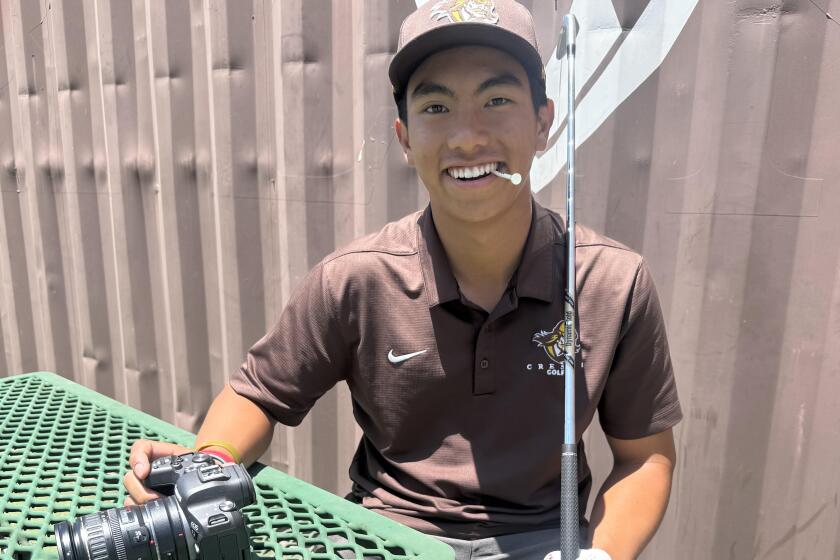Pioneers in Girls’ Sports Lauded
- Share via
Jackie Campbell, 72 years old and an active resident of Leisure World, a participant in swimming, golf and gardening, was speaking of the “tingles” she has felt watching American women win Olympic gold medals in softball and hockey and a soccer World Cup gold medal this summer.
“I’ve just loved it,” Campbell says, “just hearing all my friends rave about these women.”
Campbell stopped speaking for a minute. And then she softly says something else. “I really resent I was born too soon.”
Tonight at the Hilton in Irvine, some 20 women who maybe were born too soon will be honored with a banquet given by the California Interscholastic Federation. “It’s long overdue to honor these women who took risks and whose relentless support for girls’ and women’s athletics played a major role in bringing about equitable opportunities for girls today,” says Michelle Mazza, CIF event coordinator.
And the heck with that, Jackie Campbell says in a good-natured grumble. If only she could have played sports.
Campbell, who worked as a coach and physical education teacher for 31 years in the Glendale Unified School District, is one of four Orange County women who will be honored tonight. The others are Joanne Kellogg, 65, of Anaheim, who was girls’ athletic director and coached two Southern Section basketball championship teams during her 38 years at Huntington Beach High; Margaret Raymondetti, 69, of Corona del Mar, who coached girls’ and boys’ swimming and girls basketball during 35 years at Tustin High; and Betsy Staley, 74, of Anaheim, former athletic director at La Habra High.
The four all say they were moved to joyous tears while watching the U.S. women’s soccer team capture not only a gold medal but the hearts and TV viewing habits of the country this summer. They say they still sometimes must rub the wonderment from their eyes when they see little girls begin playing sports in grade school with the expectation of receiving college scholarships.
“It’s a long way from GAA,” Raymondetti says.
GAA was the Girls Athletic Assn. It was the umbrella under which girls had “play days” way back in the dark ages of the 1950s, 1960s and even into the 1970s.
“Play days,” Raymondetti says. “Several schools would bring teams to one place. We’d play some games and at the end the girls got Popsicles.” Popsicles? “Yes, Popsicles.”
Campbell remembers the battles she fought at Glendale, battles just to secure space for the girls to have PE classes.
“The tennis courts were supposed to be the domain of the girls for the first nine-week period,” she says. “So we get our classes all set up, here we were, ready to go, and out come 12 boys with rackets. No instructors or supervisors. And they take over the courts.
“That just about knocked the pins out of me. I was really furious. I went stomping to the principal. He says, ‘Well, um, we changed our minds about that. The boys get the courts.’ That was the kind of battle I had. What little space the girls would get and then how to keep it.”
Staley could never figure out, as she grew up running and jumping and playing any game that had a ball involved, why she would hear that it wasn’t “ladylike” for girls to run and jump and throw. And how, as she says, “girls shouldn’t sweat. Ever.”
Campbell, who grew up in small towns in Nevada and Colorado, would listen to men say that women didn’t have the stamina to play full-court basketball, and then she would go out and play full-court basketball and even, yes, baseball. “With a hardball,” she laughs. “I couldn’t understand why people would think girls didn’t have the stamina because I was doing it.”
“Yes,” Raymondetti says, “lack of stamina. Such a joke.”
Raymondetti plays golf and is a member of the Newport Harbor Lady Anglers. It was when she was coming back from a fishing trip on San Clemente Island that Raymondetti heard she was being honored by the CIF.
“It’s such an honor,” she says, “and it will be such a good time.”
Campbell says she’ll be bringing her own rooting section Friday night, 20 friends.
It would be nice for these women to hear cheers. It is something they never got to hear as athletes. It is something they never imagined hearing. It was something impossible for them to hear.
“A lot of girls today don’t realize how things used to be,” Kellogg says. “That’s great for them, but girls today are so fortunate to have the opportunities that are available. I never would have imagined it.”
Kellogg learned to coach basketball on her own. She attended clinics, she watched tape, she counts herself lucky to have been in Orange County, where she could watch the Coach Billie Moore’s teams at Cal State Fullerton. But no one ever cheered for Kellogg as an athlete.
In a hotel ballroom, Kellogg, Raymondetti, Staley and Campbell will see old friends and talk over the bad old days. And, at the end, let’s hope they experience a first themselves:
A standing ovation.
Diane Pucin can be reached at her e-mail address: diane.pucin@latimes.com
More to Read
Get our high school sports newsletter
Prep Rally is devoted to the SoCal high school sports experience, bringing you scores, stories and a behind-the-scenes look at what makes prep sports so popular.
You may occasionally receive promotional content from the Los Angeles Times.






